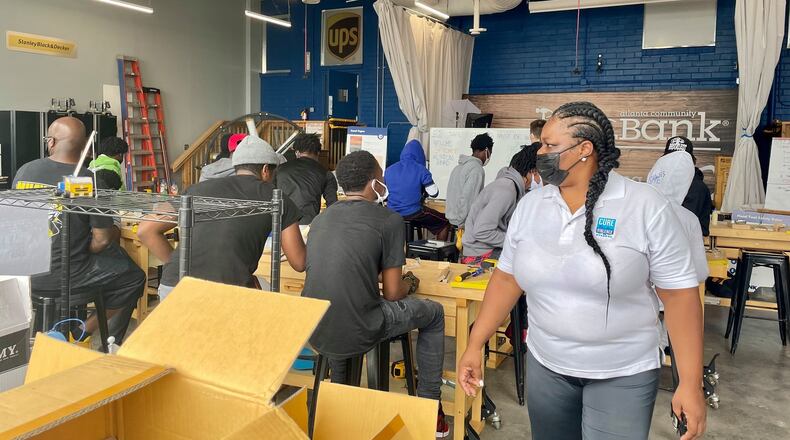When a shooting occurs within a cluster of neighborhoods just south of I-20 in Atlanta, police officers aren’t the only ones to respond to the scene.
People like Tekesia Shields are often dispatched too. And they stay involved long after the crime scene tape is taken down.
Shields will offer counseling and resources to the shooting victims, make sure neighbors are OK and work to figure out what led to the conflict. In other instances, Shields aims to stop violence before it happens, working out disagreements before they escalate to gunfire.
Her work is part of an initiative called Cure Violence, a program that originated in Chicago and began in Atlanta in the summer of 2020.
The local Cure Violence program currently focuses on Neighborhood Planning Unit V, which includes the neighborhoods of Adair Park, Capitol Gateway, Mechanicsville, Peoplestown, Pittsburgh and Summerhill. It is set to soon expand to two more areas of the city, employing community members like Shields to play the role of messenger and “violence interrupter,” resolving street-level conflicts and providing support to residents.
“Once the incident is over, that person still lives in the community,” said Shields, a program supervisor for the Cure Violence initiative through the nonprofit CHRIS 180. “We want to not only address the individual that has been impacted by the trauma. We want to impact the whole community.”
The effort could be a critical tool in reducing gun violence in Atlanta after fatal shootings surged for a second straight year. Atlanta is on pace to surpass last year’s homicide total of 157, which was the most in more than two decades. Police officials have repeatedly said many of the killings followed arguments between people who knew one another — the type of incidents Cure Violence hopes to prevent.
Credit: Courtesy/CHRIS 180
Credit: Courtesy/CHRIS 180
The program is set to expand with support from Atlanta City Hall. Mayor Keisha Lance Bottoms announced in March she planned to allocate $5 million in American Rescue Plan Act funds toward Cure Violence initiatives, currently supported in part by the Annie E. Casey Foundation.
Earlier this month, Bottoms announced the city’s new Office of Violence Reduction would spearhead the the Cure Violence expansion to two more areas of the city that have struggled with violent crime. One of the expansion sites will be focused on Bankhead, Vine City and Washington Park on the Westside, and the other will be in Oakland City, Campbellton Road and Venetian Hills in southwest Atlanta. The city solicited proposals from nonprofits to administer the expansion.
Credit: Rebecca Wright
Credit: Rebecca Wright
The Cure Violence staff members are known and trusted in the communities they work in. Some have direct experience being a victim of violence or a perpetrator themselves, giving them a unique ability to build trust with others who have similar backgrounds. Shields has a son who is currently incarcerated.
“A lot of time you kind of let them know, ‘I understand where you come from. I’ve been in your shoes.’ The purpose is to gain trust,” she said. “Who better to go back out and reach the community than somebody who’s actually been through the system?”
‘Contagion effects’ of gun violence
Cure Violence staff members aren’t law enforcement officers. Rather, the program’s philosophy approaches gun violence from a public health perspective.
“The main idea is that violence behaves like a communicable disease and has contagion effects, and a disease is propagated through conflict, particularly retaliatory conflict,” said Volkan Topalli, a criminologist and professor at Georgia State University who said the Cure Violence model is seen as a useful addition to other public safety measures.
“Who better to go back out and reach the community than somebody who's actually been through the system?"
The violence interrupters are sometimes able to mediate conflicts if they hear a rumbling about a disagreement that police detectives wouldn’t ordinarily know about.
“Now we’ve created a space in the city of Atlanta where there’s value in a non-policing program.” said Alfred Garner, CHRIS 180′s director of Zone 3 community initiatives. “Everything is not a 911 or police call.”
In addition to bringing individuals in to work out a conflict, they also offer resources like behavioral health or housing services. Garner said the half-dozen Cure Violence staff members have done 50 mediations and deployed into the community more than 25 times.
Credit: JOHN SPINK / AJC
Credit: JOHN SPINK / AJC
It’s not a safe job, Garner stressed, given the volatile situations they sometimes enter. But the staff members are uniquely qualified, given their knowledge and credibility among their neighbors.
“Cure Violence people are within our community. They are the people that live in our neighborhood and know some of the residents that are drivers of the crime,” said Stephanie Flowers, the chair of NPU-V and a 40-year resident of the area. “They are able to have those conversations.”
She said the group’s “healing circles,” in which community members and gun violence victims can openly speak about trauma they experienced, are especially impactful. As the program is set to launch in two new NPUs, Flowers urged leaders in those neighborhoods to keep an open mind. Change won’t happen overnight, she said.
“It’s not a cookie-cutter approach,” she said. “It’s something that is different. It stretches you a little bit. It’s going to be a little uncomfortable.”
— Staff reporter Shaddi Abusaid contributed to this report.
About the Author
Keep Reading
The Latest
Featured






